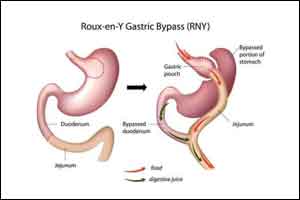- Home
- Editorial
- News
- Practice Guidelines
- Anesthesiology Guidelines
- Cancer Guidelines
- Cardiac Sciences Guidelines
- Critical Care Guidelines
- Dentistry Guidelines
- Dermatology Guidelines
- Diabetes and Endo Guidelines
- Diagnostics Guidelines
- ENT Guidelines
- Featured Practice Guidelines
- Gastroenterology Guidelines
- Geriatrics Guidelines
- Medicine Guidelines
- Nephrology Guidelines
- Neurosciences Guidelines
- Obs and Gynae Guidelines
- Ophthalmology Guidelines
- Orthopaedics Guidelines
- Paediatrics Guidelines
- Psychiatry Guidelines
- Pulmonology Guidelines
- Radiology Guidelines
- Surgery Guidelines
- Urology Guidelines
Preoperative weight loss leads to better outcomes in Bariatric Surgery

According to a new research finding Preoperative weight loss in Bariatric Surgery leads to better postoperative outcomes .Dr. Hutcheon and associates have demonstrated that in case of patients losing at least 8 percent of excess weight just one month before the procedure there is enhancement in ability to shed even more pounds in the year following surgery.The findings of new study have been published ahead of print as an “article in press” on the website of the Journal of the American College of Surgeons .
Apart from the weight-loss procedure itself, diet and weight loss before the operation may also determine how successful a person is in losing pounds during the first year after the procedure.
“Our ultimate goal was to see what makes postoperative outcomes better for our patients undergoing this lifesaving procedure,” Dr. Scott said.
The study patients were asked to lose at least 8 percent of their excess weight by following a 1200 calorie diet for four weeks immediately preceding their operations. For the analysis, the patients were divided into two groups based on whether they actually achieved that weight loss goal (224 patients achieved that goal, and 131 did not).
Patients who lost at least 8 percent of their excess weight achieved a 7.5 percent greater weight loss at the 12-month post-surgery mark, compared with those who did not achieve that weight loss goal. This finding held true even when other factors such as age, gender, ethnicity, and health problems including high blood pressure and diabetes were considered.
Dr. Hutcheon explained that there is this key window of opportunity after bariatric surgery, up to 18 months, when many physical and metabolic changes occur that help facilitate weight loss. “After that time point, patients will have to rely on diet and exercise and lifestyle management to maintain that weight loss,” she said.
“We call it the honeymoon period of bariatric surgery,” Dr. Scott added. “After a year or year and a half, your body starts to figure out what it can and can’t do, and your behaviors may change a little bit, so the odds that you are going to lose a significant amount of weight after that time period are definitely decreased. Therefore, the more weight you can lose during that honeymoon period, the better, because that effort will help establish a set point, in terms of where your steady weight is going to be further down the road.”
The analysis also showed a reduction in hospital length of stay (1.8 days vs. 2.1 days) for patients who achieved that target weight loss (8 percent or greater), and the average operative time was shorter (117 minutes vs. 125 minutes) for that group as well.
“Ultimately, we believe that preoperative preparation for bariatric surgery should be mediated by individual surgeons taking care of their patients,” Dr. Scott said. “And this 8 percent target should not be used as a hard set point to qualify patients for bariatric surgery. Because patients with obesity who weren’t able to achieve that 8 percent goal still had dramatic effects in terms of how much weight they lost and comorbidity resolutions.”
The most important aspect of this study is that it adds to the body of research data showing that it is beneficial for bariatric surgery programs to encourage and counsel patients to follow a short-term diet or aim to achieve weight loss prior to bariatric surgery.
“One of the things we often say is bariatric surgery is a tool; it’s not the end-all-be-all for weight loss. So it’s really about making sure this tool is used wisely and proactively by our patients and having it work most effectively in the long run,” Dr. Hutcheon said.
For future investigations, the researchers hope to explore the impact that presurgery weight-loss programs have on longer term (more than one year) surgical outcomes.
Other study authors are Allyson L. Hale, BA; Joseph A. Ewing, PhD; Megan Miller, RDN, LD; Francisco Couto, MD; Eric S. Bour, MD, FACS and William S. Cobb, IV, MD, FACS.
Citation: Short-Term Preoperative Weight Loss Improves Postoperative Outcomes in Bariatric Surgical Patients. Journal of the American College of Surgeons. Available at: http://www.journalacs.org/article/S1072-7515(17)32195-6/abstract.

Disclaimer: This site is primarily intended for healthcare professionals. Any content/information on this website does not replace the advice of medical and/or health professionals and should not be construed as medical/diagnostic advice/endorsement or prescription. Use of this site is subject to our terms of use, privacy policy, advertisement policy. © 2020 Minerva Medical Treatment Pvt Ltd